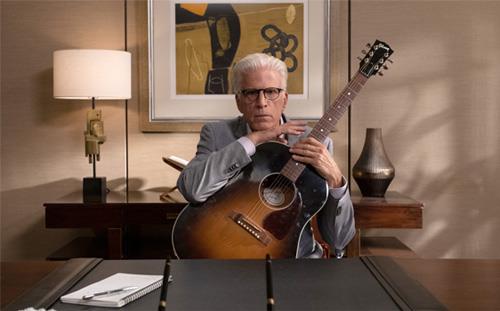
[Warning: The following contains a timeless universe of spoilers about the final episode of The Good Place.]
To say The Good Place had the right ending is not to say it had the ending a lot of its fans wanted.
NBC's delightful sitcom, one of TV's best in years, reached the end of its road Thursday after just 52 episodes, or less than 20 hours of television.
Longer would have been nice, but as star Kristen Bell said Thursday night on the aftershow, it was a lot like life. Time is short; you work with what you have.
Or, to invoke another rationale as accurate as it is dusty, better to leave the party while everyone loves you than to hang around until people start to wonder why you're still there.
In any case, The Good Place gently and firmly resisted the temptation to end with a group hug. That would have been way too easy, though arguably heartwarming for the six core characters who literally had gone through hell together.
Four were humans who, as the show began, had just died: Eleanor Shellstrop (Bell), Tahini Al-Jamil (Jameel Jamila), Chidi Anagonye (William Jackson Harper), and Jason Mendoza (Manny Jacinto).
Michael (Ted Danson) was the architect of The Bad Place, where all four had been sent. Only he made them think it was The Good Place, aiming to amuse himself by torturing them with a million incremental frustrations.
Janet (D'Arcy Carden) was one of Michael's assistants, a robot programmed with all the information in the universe. Think Alexa in a blue jumper.
As the seasons progressed, a struggle emerged between the other demons from The Bad Place and these four humans, eventually abetted by a penitent Michael and a surprisingly empathetic Janet, over where their souls would really spend eternity.
Except it wasn't just these four souls. It was the souls of all humans since these four were fighting against the widespread belief in the afterlife that all humans had become a flawed, selfish, irresponsible race slowly destroying the perfectly good planet on which they had been placed to live. The moral corruption ran so deep that salvation had been taken off the table as an afterlife option.
Thus began a long tug of war, with each side having good and bad weeks amidst a steady patter of fast-paced, clever dialogue further brightened with euphemisms for naughty words and pop culture references.
Quick footnote here.
The pop culture references continued right to the end, with Chidi telling Eleanor in the last episode that Socrates, Aristotle, Plato, and Demosthenes all speaking from the same Forum in Athens was "like the Avengers."
The dirty-word substitutions, a staple of almost everything Eleanor said for two or three seasons, had virtually disappeared by the end.
That's not just a fun fact. It tells us that Eleanor, in particular, had grown up. She wasn't all grown up, and she still loved the trashy side of life, but she was kinder and more considerate. For the first time ever, she thought about others.
That is to say, as the show rolled down the line, it argued that humans could change and become better.
It might be overstating to say that The Good Place challenged the ominous theological implications of Original Sin, but it did postulate that humans could earn redemption and, therefore, in keeping with other Biblical teachings, earn the right to eternal happiness.
The Good Place.
Creator Michael Schur could have taken that easy, satisfying and heartwarming path. He could have had Eleanor, Tahini, Chidi, Jason, Janet, and Michael live, literally, happy ever after. He had even teed that scenario up by making a couple of Eleanor and Chidi and an unlikely couple of Jason and Janet.
And then, in the finale, he flicked the ball off the tee and hit a different shot.
Chidi, the philosopher who spent his Earth life driving himself crazy over the contradictions in moral theory, talked to Eleanor about the Buddhist view that life is like an ocean wave that rises for a brief time and then recedes into the ocean – but is always water.
Given that The Good Place's primary audience is more steeped in Western religions, that may have felt a little abstract.
But Schur did not back down on Chidi. He doubled down. By the end of the final episode, Schur broke up the band, sending them on separate paths to ultimate fates we do not see and, sorry pal, cannot know.
He did make a couple of housekeeping points clear. As he had hinted in earlier episodes, spending forever doing what we think we want – whether it's playing video games, reading great literature, or listening to the Temptations sing "My Girl" – isn't enough.
While we don't necessarily need new people, we need new challenges. It turns out that Shakespeare's 400thplay wasn't nearly as electrifying as his first couple of dozen.
We also need to be in situations where we can fail, where things can go wrong, and we can't summon a Janet to make them right. As Schur sees it, that's as much a part of the ride in the next life as in this one.
Our heroes were about to spend eternity being tortured by demons in The Bad Place. They extricated themselves and made it to The Good Place.
After many ages there, they needed a different place, call it a Better Place, even if they didn't know what awaited them.
Projecting through the sequel that will exist only in our imaginations, they might from there sometime have to find The Best Place.
Except that implies that such a final destination could exist, when in fact, our lesson from The Good Place was that the reward will always lie in the journey.
Janet, play "My Girl."